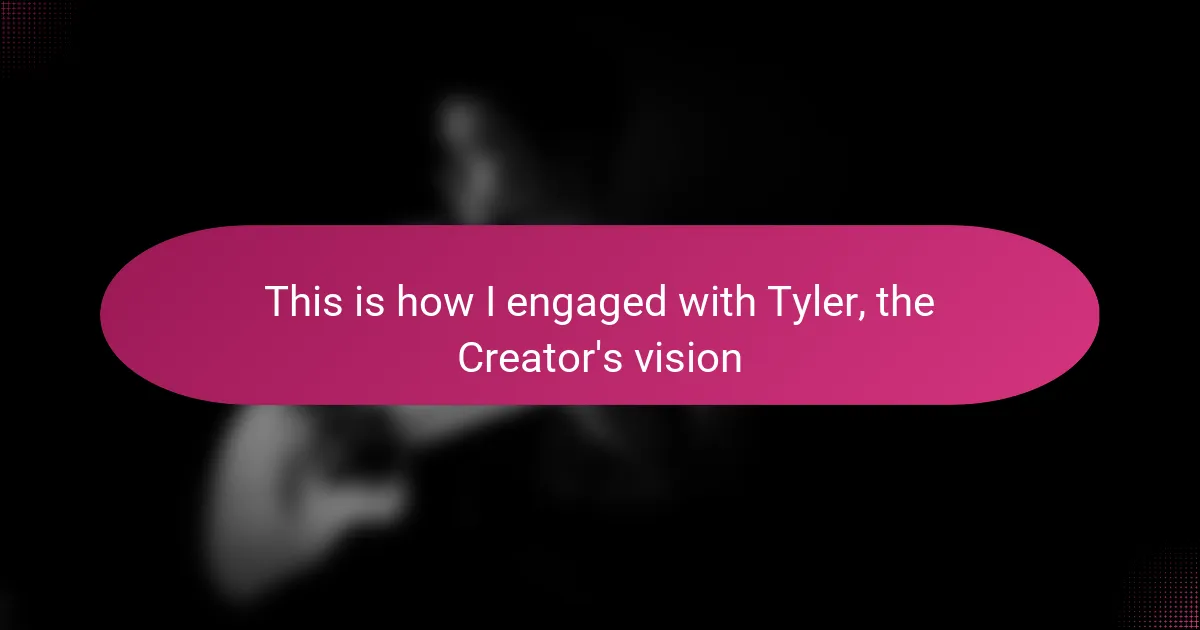Key takeaways
- Tyler the Creator’s work emphasizes authenticity, vulnerability, and emotional depth, encouraging artists to confront their own identities.
- His innovative fusion of contrasting elements, such as humor and darkness, adds complexity to music, making it relatable and engaging.
- Applying Tyler’s creative vision can lead to personal breakthroughs in artistry, particularly by embracing unpredictability and sharing personal stories.
- The challenge of breaking norms in rap fosters deeper connections with audiences and encourages a fearless approach to self-expression.
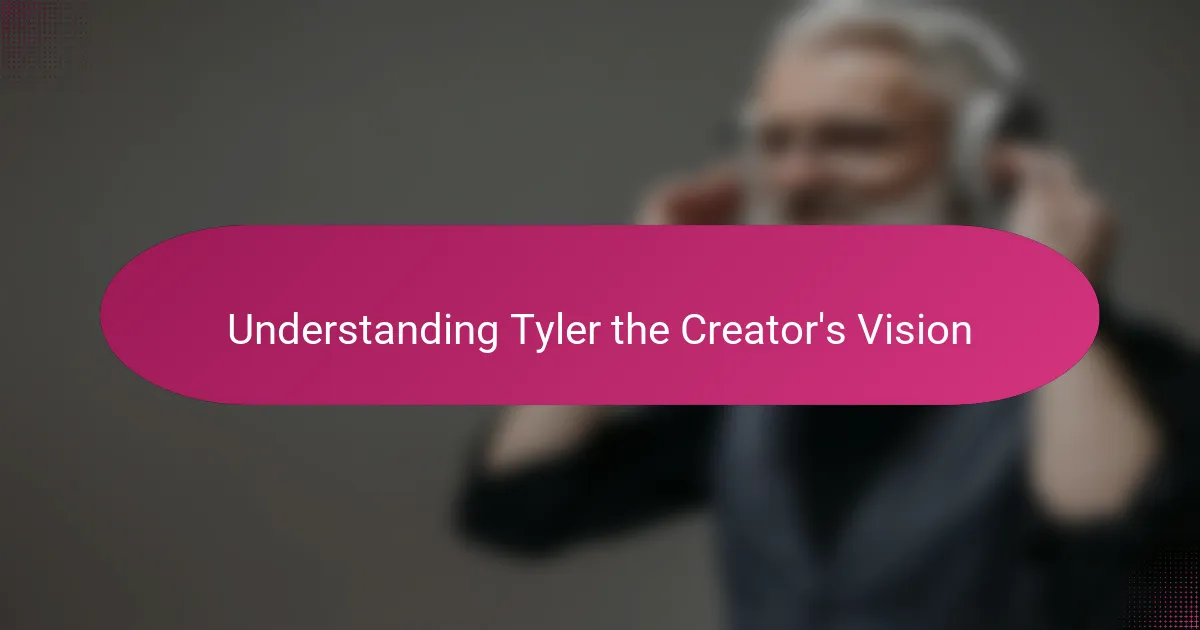
Understanding Tyler the Creator’s Vision
Tyler the Creator’s vision is something I’ve found both challenging and rewarding to grasp. It’s not just about the music; it’s a multi-layered exploration of identity, creativity, and vulnerability. Have you ever encountered an artist who pushes you to question your own perceptions? That’s exactly what Tyler does for me.
When I first dove into his work, I was struck by how unapologetically raw and experimental everything felt. It’s like he’s inviting us into his mind—sometimes chaotic, sometimes tender, but always authentic. This kind of artistic honesty made me reflect on how I approach my own creativity and self-expression.
What really stands out is the way Tyler blends humor with darker themes without ever losing sincerity. That balance keeps me coming back, wondering what layers I might have missed before. It makes me appreciate how complex and daring his vision truly is, challenging the norms of rap and art itself.
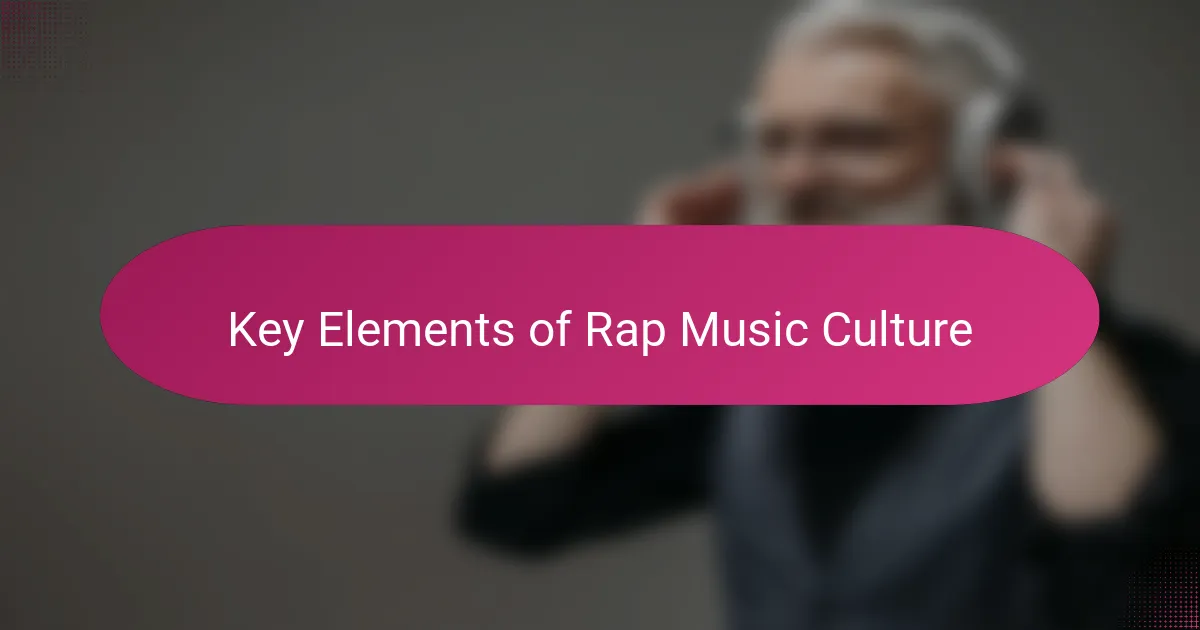
Key Elements of Rap Music Culture
Rap music culture feels like this vibrant tapestry woven from storytelling, community, and self-expression. To me, it’s not just about beats or rhymes; it’s the way artists share their truths—raw, unapologetic, often gritty—and connect with listeners on a real, emotional level. Have you ever felt that rush when a lyric perfectly captures a moment in your life? That’s the heart of this culture.
I’ve noticed the importance of authenticity stands out as a key pillar. It’s fascinating how artists build their identities and narratives through rap, often turning personal struggles into powerful anthems. This makes me wonder: how many stories have stayed untold because the culture didn’t feel safe or welcoming enough?
Then there’s the element of innovation—rap music constantly evolves, blending sounds and styles to push boundaries. I remember hearing a track that flipped traditional rhythms in a way that caught me completely off guard, making me rethink what rap could be. This ongoing reinvention keeps the culture alive and deeply inspiring.
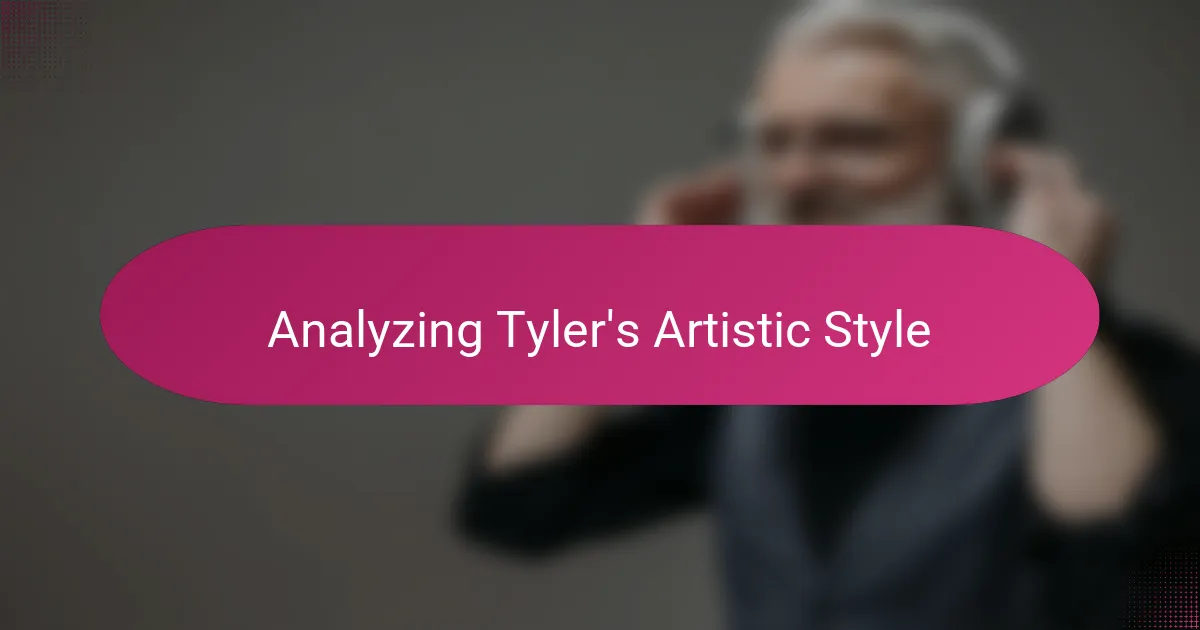
Analyzing Tyler’s Artistic Style
Tyler’s artistic style is a fascinating fusion of bold experimentation and emotional vulnerability. I’ve always admired how he isn’t afraid to rebel against conventional rap norms, mixing dissonant beats with melodic hooks that feel both unsettling and inviting. Have you ever listened to a track where the sound itself seems to challenge your expectations? That’s Tyler’s style in action.
What strikes me most is his use of vivid storytelling and visual imagery in his music. It’s like he’s painting scenes with his words, sometimes grotesque, sometimes tender, but always deeply personal. This approach made me realize how much rap can transcend just audio—it’s about creating immersive experiences that linger in your mind long after the song ends.
I also can’t ignore the quirky, playful side of his style that contrasts with the darker themes he explores. It’s as if Tyler uses humor to disarm us, then pulls us into more profound emotional spaces. I find myself laughing one moment and reflecting the next, which keeps his art feeling unpredictable and alive. Have you noticed how rare that kind of balance is in rap today?
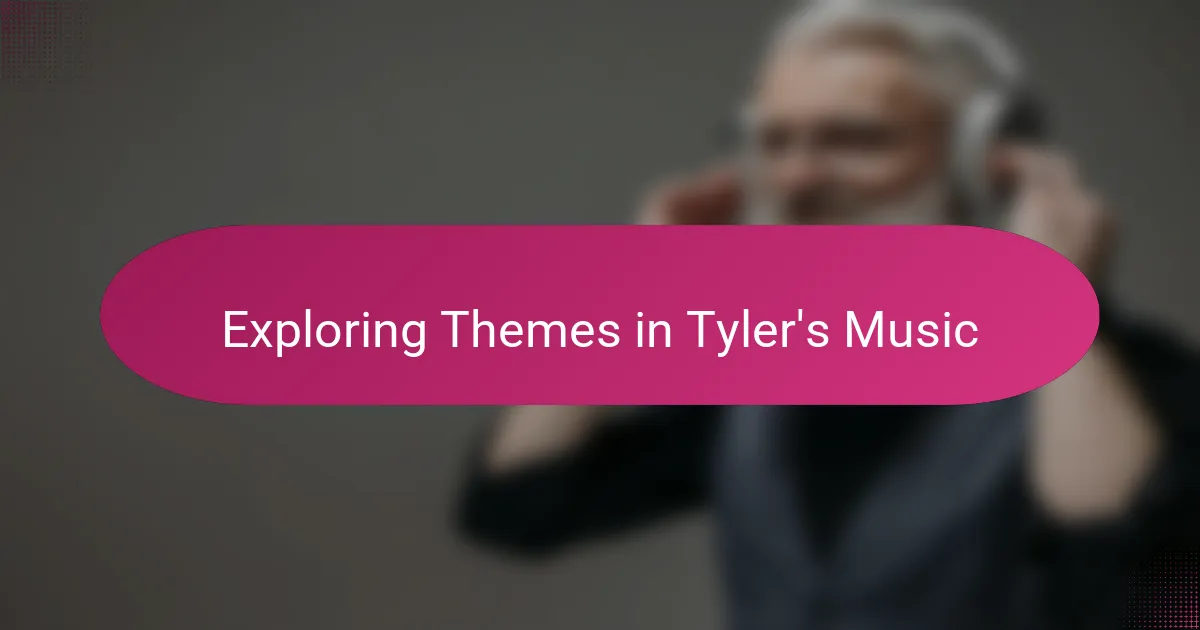
Exploring Themes in Tyler’s Music
Tyler’s music dives deep into themes of identity and self-acceptance, which really resonated with me during a time I was questioning my own sense of self. Have you ever heard a song that feels like it’s speaking directly to your inner struggles? That’s the power of the way he explores vulnerability—not as a weakness but as a form of strength.
Another theme that grabbed my attention is Tyler’s take on freedom and rebellion. His tracks often challenge societal expectations, and I found that rebellious energy contagious. It made me think about the ways I limit myself and how breaking free from those chains can be a form of self-expression, much like Tyler’s music encourages.
What intrigues me most is how he blends darkness with humor to tackle complex emotions. This mix keeps the themes from feeling heavy-handed; instead, it creates a layered experience where I find myself laughing and reflecting in the same song. Isn’t it remarkable how that duality invites us to embrace all parts of our human experience?
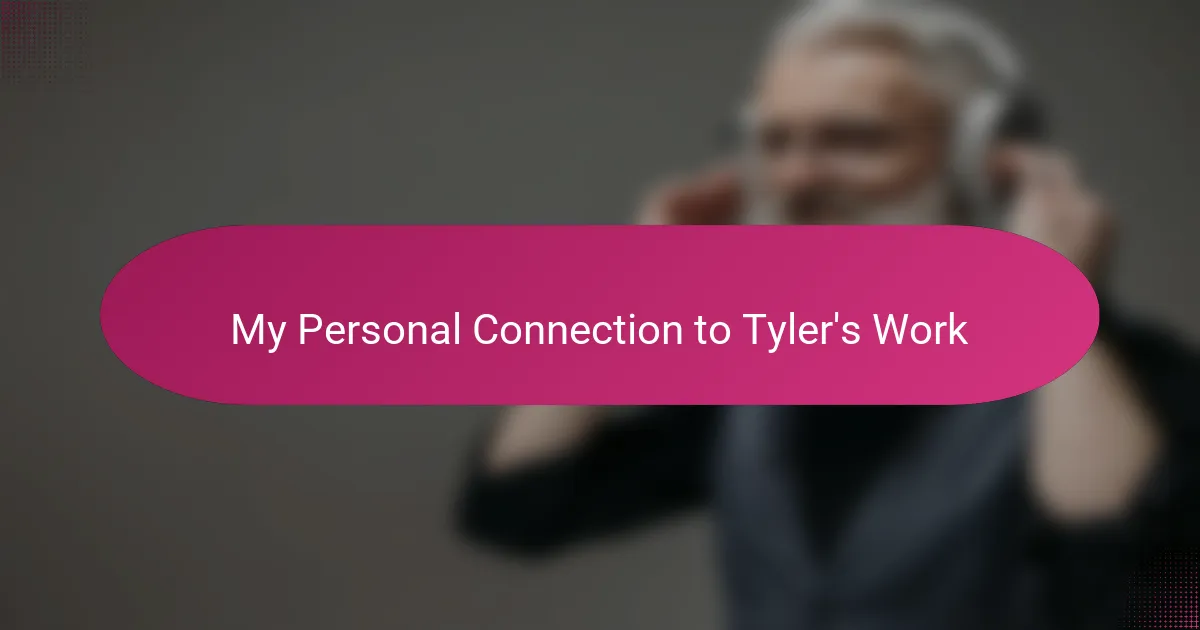
My Personal Connection to Tyler’s Work
There was a moment when I first heard Flower Boy all the way through, and it felt like Tyler had peeled back the layers of his soul just for me. Have you ever experienced music that doesn’t just play in the background but actually stirs something inside you? That album connected with my own struggles and growth in a way that felt deeply intimate.
What I find most compelling about my connection to Tyler’s work is how it challenges me to confront my own contradictions. His fearless honesty encourages me to embrace the messy parts of myself rather than hide them. It’s a rare feeling to find an artist whose vulnerability serves as a mirror to your own.
Sometimes, I catch myself quoting his lyrics in moments of uncertainty, like a secret language that helps me process complex emotions. Doesn’t it amaze you how art can become a lifeline in confusing times? Tyler’s vision isn’t just entertainment—it’s a companion on my journey of self-discovery.
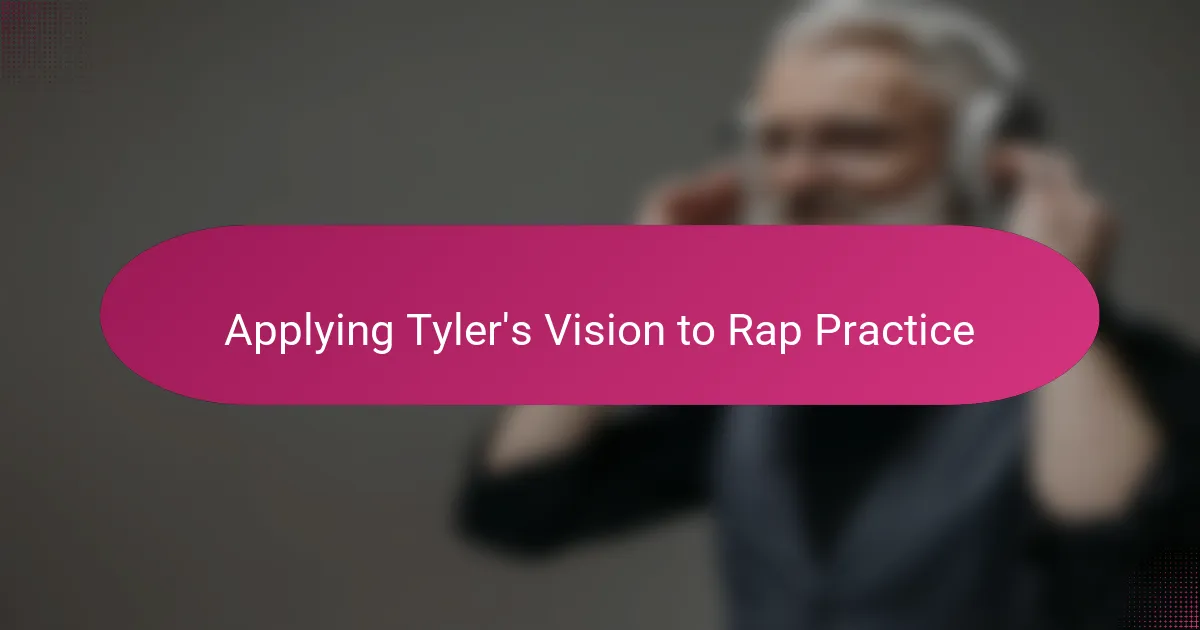
Applying Tyler’s Vision to Rap Practice
Applying Tyler’s vision to my rap practice has meant embracing unpredictability and rejecting the idea of sticking to a formula. I’ve started playing more with contrasting sounds—mixing aggression with softness—because Tyler showed me how those juxtapositions can create something fresh and emotionally charged. Have you ever felt stuck because your music was too predictable? Breaking away from that comfort zone felt like a breakthrough for me.
I also realized the importance of vulnerability in my lyrics, something I’d often avoided out of fear. Listening to Tyler, I learned that sharing flaws and struggles doesn’t weaken a rap—it makes it deeper and more relatable. When I began weaving more personal stories into my verses, it was like unlocking a new level of connection with my audience, even if it was scary at first.
And humor—yes, humor!—became a tool I hadn’t given much thought to before. Tyler’s way of blending lightness with heavy themes reminded me that rap can be playful without losing its edge. Sometimes, a well-placed joke or self-deprecating line can break tension and invite listeners into the music in unexpected ways. Have you tried injecting humor into serious tracks? It can transform the vibe entirely.
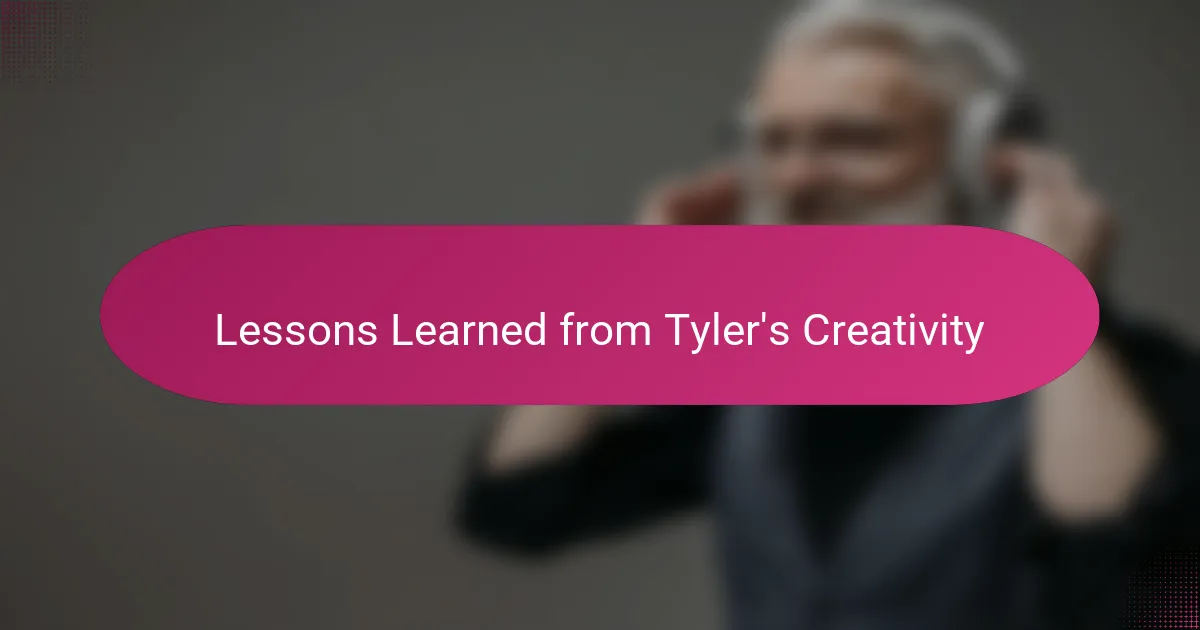
Lessons Learned from Tyler’s Creativity
Tyler’s creativity taught me that true innovation comes from being brave enough to break rules and embrace imperfections. Have you ever caught yourself holding back because you feared your ideas weren’t “perfect” enough? Watching Tyler fearlessly experiment reminded me that authenticity often lives in those rough, unpolished moments.
Another lesson I took to heart is the power of blending contrasting elements—light with dark, humor with pain—to create something layered and compelling. I used to think rap had to fit into neat categories, but Tyler’s work showed me how pushing boundaries can deepen emotional impact and keep listeners hooked. Isn’t it freeing to realize that complexity and contradiction can be strengths, not weaknesses?
Finally, Tyler’s relentless commitment to personal storytelling challenged me to dig deeper into my own experiences. I found myself asking: what stories am I afraid to tell? Sharing vulnerability on that level felt risky, but it also opened a new dimension in my music that felt honest and real. Have you noticed how when you share your truth, it resonates in ways you didn’t expect? That’s the kind of connection Tyler’s creativity inspired me to seek.
